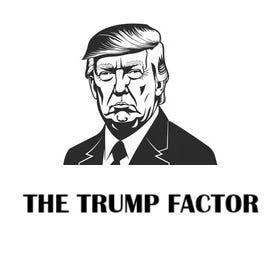The Trump Factor: Canadian Automotive Leaders Demand A Stronger Response

Table of Contents
Economic Impacts of the Trump Administration's Trade Policies on Canada's Automotive Sector
The Trump administration's protectionist trade policies inflicted significant economic damage on Canada's automotive sector. Tariffs, trade disputes, and the overall climate of uncertainty had profound and lasting consequences.
Job Losses and Plant Closures
The imposition of tariffs led to substantial job losses and plant closures across the Canadian automotive landscape.
- General Motors: Closure of the Oshawa assembly plant resulted in the loss of over 2,500 direct jobs and thousands more in the supply chain.
- Ford: Significant job reductions at various Canadian plants due to reduced production resulting from trade uncertainty.
- Parts Suppliers: Numerous smaller parts suppliers experienced layoffs and closures as a result of decreased demand from major automakers.
These job losses represent not only a significant economic blow but also a social and community impact, particularly in regions heavily reliant on the automotive industry. The economic damage extends beyond direct employment, impacting local businesses, and reducing overall economic activity.
Supply Chain Disruptions
The intricate global supply chains of the Canadian automotive industry proved highly vulnerable to the disruptions caused by trade disputes. The imposition of tariffs and threats of further trade actions created uncertainty, forcing companies to reconsider their sourcing strategies and leading to:
- Increased costs for raw materials and parts due to tariffs and logistical complexities.
- Production delays resulting from the inability to source components efficiently.
- A shift in sourcing strategies towards more expensive, less efficient alternatives.
The interconnected nature of automotive supply chains means that a disruption at one point can quickly ripple through the entire system, impacting production, profitability, and ultimately, employment. The Trump-era trade policies starkly exposed these vulnerabilities.
Investment Deterrence
The uncertainty generated by the Trump administration's unpredictable trade policies significantly deterred foreign direct investment (FDI) in the Canadian automotive sector. Companies hesitant to commit to long-term investments in an environment rife with trade tensions.
- Several planned expansions and new facility projects were delayed or cancelled due to trade uncertainty.
- Foreign automakers showed a reluctance to invest in Canadian facilities, preferring locations with greater trade predictability.
- This lack of investment hampered innovation, modernization, and the overall competitiveness of the Canadian automotive industry.
The resulting loss of potential economic growth and job creation represents a significant long-term consequence of the "Trump Factor."
The Canadian Government's Response: Strengths and Weaknesses
The Canadian government's response to the challenges posed by the Trump Factor has been a mixed bag, exhibiting both strengths and weaknesses.
USMCA Negotiations and Outcomes
The negotiation of the United States-Mexico-Canada Agreement (USMCA) was a crucial response to the trade tensions ignited by the Trump administration. While the USMCA replaced NAFTA, securing some level of trade predictability, it didn't fully mitigate the damage already done.
- The agreement includes provisions related to rules of origin for automobiles, aimed at promoting North American production. However, these provisions are complex and their effectiveness is still being assessed.
- While tariffs were avoided, the uncertainty leading up to the agreement caused significant economic damage.
- The agreement didn't fully address the issues of investment deterrence or the damage already inflicted on the supply chain.
Investment in Research and Development
The Canadian government has implemented various programs aimed at supporting innovation and technological advancements within the automotive sector. These programs include funding for research and development in electric vehicles (EVs), autonomous driving, and other advanced technologies.
- Several initiatives focus on supporting the development of next-generation batteries and EV components.
- Funding for research collaborations between universities and industry aim to accelerate innovation.
- However, the long-term impact and effectiveness of these programs in countering the effects of the "Trump Factor" require further evaluation.
Support for Workers and Communities
Government programs provide support for workers and communities impacted by job losses and plant closures. These initiatives include retraining programs, job placement services, and community development funding.
- Programs focused on helping displaced workers acquire new skills for emerging industries.
- Funding provided to communities affected by plant closures to help diversify their economies.
- However, the effectiveness of these programs in addressing the long-term economic consequences is still being assessed. The scale of the job losses requires substantial and ongoing support.
The Call for a Stronger Response: Future Strategies for the Canadian Automotive Industry
To overcome the lingering effects of the "Trump Factor" and build a more resilient automotive sector, Canada needs a proactive, multi-faceted strategy.
Diversification of Trade Partners
Reducing dependence on the US market is crucial. This involves actively pursuing trade agreements and strengthening economic ties with other countries:
- Exploring opportunities with Asian markets, particularly for EVs and related technologies.
- Strengthening trade relationships with European nations and other international partners.
- This diversification reduces vulnerability to future trade disruptions stemming from a single major trading partner.
Investing in Electric Vehicles and Green Technologies
Transitioning to electric vehicles and investing in green technologies is vital for long-term competitiveness and sustainability.
- Continued government investment in EV infrastructure and battery technology development.
- Incentives for consumers to purchase EVs and other green vehicles.
- Supporting the development of a domestic supply chain for EV components.
Strengthening Bilateral Trade Agreements
Negotiating robust and comprehensive trade agreements with diverse partners ensures market access and reduces future trade risks.
- Focusing on agreements that prioritize innovation and technology transfer.
- Including strong provisions for dispute resolution and investor protection.
- Building strong, mutually beneficial relationships with a range of global partners.
Conclusion: The Trump Factor and the Future of Canadian Automotive Leadership
The "Trump Factor" represents a significant challenge, but also an opportunity for the Canadian automotive industry to adapt and thrive. While the USMCA offered some stability, the lasting economic and social impacts of the Trump administration's trade policies cannot be ignored. The need for a stronger and more proactive response from the Canadian government and the industry itself remains paramount. From diversifying trade partners to investing heavily in green technologies, Canada must adopt a forward-looking strategy to secure a robust and sustainable future for its automotive sector. The Trump Factor demands continued vigilance and proactive strategies. Let's ensure a robust and sustainable future for the Canadian automotive sector by demanding further action from our leaders.

Featured Posts
-
 Chef Tiffany Derry Judges Master Chef A Dallas Success Story
May 23, 2025
Chef Tiffany Derry Judges Master Chef A Dallas Success Story
May 23, 2025 -
 How To Write Effective Briefs A Step By Step Guide For Professionals
May 23, 2025
How To Write Effective Briefs A Step By Step Guide For Professionals
May 23, 2025 -
 Guia Astrologica Semanal Del 1 Al 7 De Abril De 2025
May 23, 2025
Guia Astrologica Semanal Del 1 Al 7 De Abril De 2025
May 23, 2025 -
 F1 Mc Larens Speed And Strategy How They Set The Pace
May 23, 2025
F1 Mc Larens Speed And Strategy How They Set The Pace
May 23, 2025 -
 Memorial Day 2025 Are Publix And Other Florida Stores Open
May 23, 2025
Memorial Day 2025 Are Publix And Other Florida Stores Open
May 23, 2025
